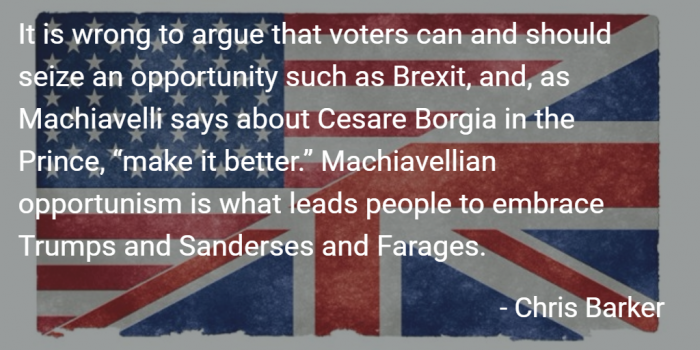 This Thursday the UK goes to the polls to decide whether the country should leave or remain in the European Union. Chris Barker sees parallels between the UK Conservative Party’s internal debate over the referendum, and the current fracturing of the Republican Party in the US. He warns that those who see Brexit as a way for the left and right movements in the UK to reinvigorate themselves may end up facing years of work sorting out the country’s EU-exit instead.
This Thursday the UK goes to the polls to decide whether the country should leave or remain in the European Union. Chris Barker sees parallels between the UK Conservative Party’s internal debate over the referendum, and the current fracturing of the Republican Party in the US. He warns that those who see Brexit as a way for the left and right movements in the UK to reinvigorate themselves may end up facing years of work sorting out the country’s EU-exit instead.
On Thursday, voters in the UK will go to the polls to determine if the country leaves or remains in the European Union. Proponents of the Remain position are sensibly concerned that a Brexit will empower right-wing parties in Germany and France, and that it will transform the British conservatives into a Eurosceptic, populist equivalent of the US Republican party after the Freedom Caucus unseated House Speaker John Boehner in 2015. Of course, British conservatives have promised that Brexit will not tear the party apart—but it is doing so in the present. Cameron is right to say that a decision for Brexit is permanent, and it is certainly so for him if Leave manages to win.
Regardless of your opinion on the social and economic consequences of a vote to leave, it is an irony of referendum politics that the allegedly principled position, Brexit, is actually an invitation to engage in personal politics that will leave the most ambitious and quotable man standing. This is because referendums do not function as tools of accountability: they are a reset button rather than a method of controlling government through criticism. The California Recall election replaced Governor Gray Davis’s free-spending, undisciplined administration with an inexperienced but familiar face, Arnold Schwarzenegger, who became a similarly centrist leader on whose watch the state deficit doubled. Voters disabused of the notion that Schwarzenegger’s star appeal would prove legislatively influential then pivoted back towards experience in electing second-time governor, Democrat Jerry Brown.
If Brexit is not salvation for the conservatives, high hopes for pushing through a more radically socially democrat program after Brexit may have the unintended consequence of restructuring UK politics around more rigid and entrenched ideological poles. UK voters who have been watching the US presidential primary process with horror and derision should wonder: who benefits? Structurally, we need political change in the here and now, but David Cameron has been and continues to be correct to call Brexit a hijacking of the party in power rather than a vehicle for real social change. To say this sounds like avoiding a judgment about Brexit on the merits, but recall that the actual, concrete next five or ten years of your life very much matter to you, and that this period of recession or growth, stability or turmoil, civic pride or shame will be very much affected by whatever decision that UK voters make.
From the perspective of the outside observer, conservative support for Brexit plays like unconvincing pocketbook voting and economic nativism rather than devolution and a genuine devotion to the “Anglosphere.” The problem may be the lack of an enforceable plan, coupled with uncertainty emphasized by Osborne’s Brexit budget. As was pointed out at a pro-business Stand Up European Referendum event at One Canada Square in Canary Wharf last week, the UK will have to renegotiate 40 years of EU regulation upon invoking Article 50. No one really knows how this will work at a granular or a global level. The softened version of the Leave position anticipates that exit will result in things being much as they are now, but with more regulatory control for England. The arch-Conservative Leave position is thoroughly saber-rattling in comparison: repeal the 1972 Act, avoid using Article 50, and simultaneously cultivate a stunning optimism about the ability to negotiate 80,000 pages of EU agreements expeditiously. So, which is it? The answer is not defined by an economic forecast, but by the leadership of the conservative party leadership, at least until they lose their slim majority. In other words, the success or failure of Brexit depends in a very real way on party politics.

The LSE’s own Swati Dhingra has argued that essentially no economist anticipates a net benefit from Brexit. But, in the same academic panel where she addressed an audience at University College London last week, it was observed that we are equally blind about the political process that moves us from an advisory referendum to a binding withdrawal from the EU within the two-year period mandated by Article 50. Another LSE political scientist projects that 30 percent of voters will change their mind during the final week, and half of that on the day of the referendum. The signal-to-noise ratio is very much compromised by exaggerations. Moderate Remainers such as MP Nick Herbert argue that the EU is “not committed to have a closer union” and that the UK must simply “lean in” to make it work. This argument is made over evidence from the Five Presidents’ report of just such a plan for further social and political integration. When arch-conservative Brexiters use the Five Presidents’ report as a flag to rally England against what Boris Johnson calls a Euro “superstate,” their point is defensible. The question is whether it is worth starting over again by negotiating a blizzard of bilateral agreements to replace nearly 7,000 EU regulations. Unlike the American presidential system, where the next US president might be happy to hear that years of work is being dumped on Congress’s plate, all the better to stop their meddling, no one benefits from clogging up British parliament, in this case not even those conservatives who argue for devolution and deregulation. Again, the answer lies in who is doing the tough job of renegotiating treaties, and how well they do it.
From the point of view of parties and political health, some see Brexit as an opportunity for a reinvigorated Labor party. Harvard University’s Richard Tuck argues that freedom from technocracy is a vote for freedom, and that it can be achieved if a British Bernie Sanders takes a giant step forward to push a leftist agenda. The same argument is also made by the Communist Party of Britain Marxist-Leninist in a recent pamphlet repudiating internationalism and open borders in favor of national economic self-determination. It very well may be historically and constitutionally correct that the best tool for radical social democratic reformers are the broad powers of British parliament rather than the tools of pan-European constitutionalism. But, in the short term, the argument is not convincing. The problem in the UK and in the US is not a lack of charismatic leaders with great aspirations, but politics that is driven by angry or panicked fear. Better the informed, rational fear that promotes concrete gains and even bipartisanism, than swinging for the fences on projects that lack broad, popular support. The polling research just does not support big changes in the social welfare state, and using Brexit as a bait-and-switch to save Labour may well harm the country.
It is wrong to argue that voters can and should seize an opportunity such as Brexit, and, as Machiavelli says about Cesare Borgia in the Prince, “make it better.” Machiavellian opportunism is what leads people to embrace Trumps and Sanderses and Farages. No doubt, as T.S. Eliot might say, these men are useful tools to swell a progress or start a scene or two; however, sometimes the Polonius that we elect becomes the leader that we regret. Finally, as a simple truth, reinvigorating a party in the flames of another party’s self-immolation is a dangerous position for any country to be in. What economic or social benefit has decades of opportunism about the demise of the Republican Party (after Barack Obama’s election and reelection) and the Democratic Party (after the election and reelection of George W Bush and the 2010 midterm elections) achieved for the US apart from stasis—endless, mindless strife?
If you do not want either party to govern, then vote for Leave and give parliament a new docket of business, namely that of reduplicating years of regulatory work that may take a decade to replace, as Dhingra projects. To choose Remain is like avoiding an audit: you do not know exactly where you stand, but you have saved yourself an abundance of time and avoided substantial risk of punishment.
Featured image credit: Nicolas Raymond (Flickr, CC-BY-2.0)
Please read our comments policy before commenting.
Note: This article gives the views of the author, and not the position of USApp– American Politics and Policy, nor of the London School of Economics.
Shortened URL for this post: http://bit.ly/28LSoOn
______________________
 Chris Barker – Southwestern College
Chris Barker – Southwestern College
Chris Barker is an Assistant Professor of Political Science at Southwestern College where he teaches political thought. He has previously held positions at Ohio University, Boston College, and Harvard University. He recently completed his first book manuscript on John Stuart Mill’s liberalism. His most recent articles have appeared or are forthcoming in Contemporary Political Theory; History of European Ideas; American Political Thought; and Law, Culture and the Humanities.







” the UK will have to renegotiate 40 years of EU regulation upon invoking Article 50″
No >> http://www.lawyersforbritain.org/brexit-trade-treaties.shtml
“it was observed that we are equally blind about the political process that moves us from an advisory referendum to a binding withdrawal from the EU within the two-year period mandated by Article 50”
Not clear what you mean here, if you’re saying there is a 2 yr period after article 50 is invoked you are correct. What you seem to be trying to imply is a #Brexit vote means an immediate invocation of article 50, which isn’t true.
“The question is whether it is worth starting over again by negotiating a blizzard of bilateral agreements to replace nearly 7,000 EU regulations. ”
Let’s say your claimed costs are real (they aren’t), what you’re asking is “It worth having true democracy, where laws and regulations are made by elected UK officials?”. if you think the answer to that, at any cost of paperwork is “no” I suggest you move to Greece and have a word with some of the locals
“From the point of view of parties and political health, some see Brexit as an opportunity for a reinvigorated Labor party”
LABOUR.
“The problem in the UK and in the US is not a lack of charismatic leaders with great aspirations, but politics that is driven by angry or panicked fear.”
Absolutely priceless, the entire Remain campaign in the UK, and indeed your article, is based upon fear.
“To choose Remain is like avoiding an audit: you do not know exactly where you stand, but you have saved yourself an abundance of time and avoided substantial risk of punishment.”
Not true, we know exactly where we stand if we choose Remain: In a country where laws and regulations are made in overseas lands, where we cannot repel those laws and regulations even if 100% of the UK population wants to do so, where at any time huge amounts of UK taxpayers money can be sequestered and used for whatever purposes the EU decides and where 500m people have the right to move to our country, claim benefits, housing and education and use our health service for free.
Would the US vote for that? Then don’t ask us to.